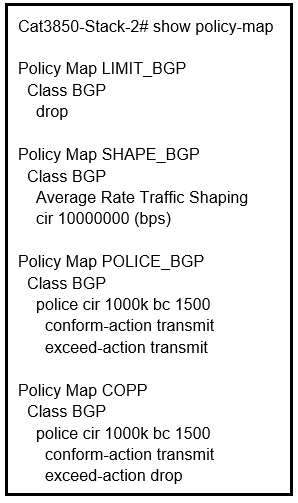
Refer to the exhibit. Which control plane policy limits BGP traffic that is destined to the CPU to 1 Mbps and ignores BGP traffic that is sent at higher rate?

Refer to the exhibit. Which control plane policy limits BGP traffic that is destined to the CPU to 1 Mbps and ignores BGP traffic that is sent at higher rate?
The control plane policy that limits BGP traffic destined to the CPU to 1 Mbps and ignores traffic that exceeds this rate is the policy map COPP. This is determined by the configuration 'police cir 1000k bc 1500' which sets the rate limit to 1 Mbps, and 'exceed-action drop' which specifies that any traffic exceeding this rate will be dropped, effectively ignoring it.
it would have been nice if cisco would use professional terminology and not use a word like "ignore". annoying!
Yup, but not this. C isn't limiting anything. It's transmitting everything.
note this*
note this*
“limits BGP traffic that is destined to the CPU” class BGP “to 1 Mbps” police cir 1000k… conform-action transmit “ignores BGP traffic that is sent at higher rate” exceed-action drop It’s policy-map COPP.
Correct is D
police cir 1000k - "policy limits BGP traffic that is destined to the CPU to 1 Mbps" exceed-action transmit - "ignores BGP traffic that is sent at higher rate"
C is wrong. Should be "exceed-action drop". Any traffic that goes beyond 1Mbps should be dropped, not transmited.
Voting. policy-map COPP is correct.
D SI CORRECT
The given answer is correct
Correct is C
I believe "ignore" the traffic that exceeds means "drop", in this case D is coorect
Di is correct, C does not police the exceeding traffic
i think ignore means let it pass through
Looking at the actual configs, POLICE_BGP is just a name and not actually doing "policing". COPP is though. Vote D
The given answer is correct
The given answer is correct
Limits and ignores at the same time? Can anyone explain this?
The authors do not want to say that to ignore is to discard?
quick check : https://networklessons.com/quality-of-service/policing-configuration-example Exceed action transmit is 'if nothing else is claiming bw then you may proceed' Exceed action drop is 'you're out of luck if you go above cir' = dropped packets Answer D- COPP is correct
I believe, in this context, "ignore" means discard so the answer is "D".
D is correct
My vote is on D, but it really depends on what they mean by "ignore". Does "ignore" mean drop? Then it's D, which is what I assume they mean. If they by "ignore" mean it processes it like normal, as if the policy map didn't exist, then the answer is C.
what the hell does "ignore" mean?